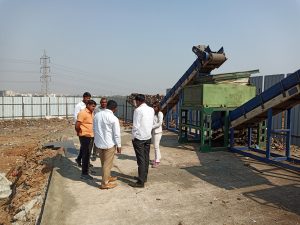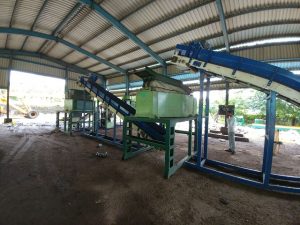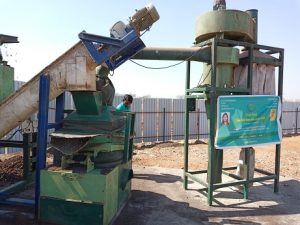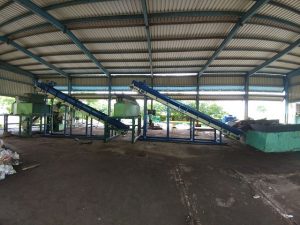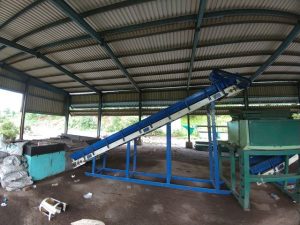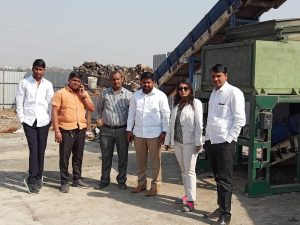Mixed Waste
Aerobic Composting is one such technology and it is considered to be one of the cheapest solutions to Mixed Municipal Solid Waste. All biodegradable material available in waste is converted into valuable soil-enriched Organic Manure. All non-biodegradable such as plastics, metals etc. are segregated, reconditioned and sold in open market. Some part of non-biodegradable consists of inert material as stones etc. which can be directly used for land filling.
Aerobic Composting is a process involving bio-chemical conversion of organic matter into humus lignopoteins by mesophilic and thermophilic organisms.
Aerobic Composting is a process involving bio-chemical conversion of organic matter into humus lignopoteins by mesophilic and thermophilic organisms.
A composting process seeks to harness the natural forces of decomposition to secure the conversion of organic waste into organic manure. This process is done under controlled conditions in order to:
- Make it aesthetically acceptable.
- Minimize the production of offensive odors.
- Avoid the propagation of insects or odors.
- Destroy pathogenic organisms present in the original waste.
- Destroy weed seeds.
- Retain the maximum nutrient content, NPK.
- Minimize the time required to complete the process.
- Minimize the land area required for the process.
Advantages of Composting:
- An ultimate solution for organic waste disposal.
- Value addition to the project by means of fertilizer generation.
- Neat and clean procedure, no odor and stink.
- Easy handling and simple procedure.
- Totally eco-friendly process and project.
- Support to the green cover in the city.
- Up-gradation of the natural resources by completing the cycle of nature.
- Meeting the requirements of various Government authorities MSW Rule2ooo and EMS of ISO 14001.
- Sets a unique example for others in your area.
Plant Selection Table:

Mechanical Composting Plant Layout:

Brief details of Mechanical Composting Plant:
Most of the Municipal Solid Waste (MSW) received at compost plant is mixture of decomposable material with plastic, metal, glass, sand and other non-biodegradable material. MSW is first received in pre-processing area of the plant. In this phase, large size objects such as tires, cans, glass articles, metals are hand picked manually.
This preprocessed MSW is then shifted to composting pad for decomposition by making windrows. Composting culture is sprayed on this waste and each windrow is turned frequently to maintain aerobic conditions for composting with maximum speed. The concrete platform is provided with peripheral drain to collect the leachate and rain water overflow.

Composted MSW is then shifted to coarse segregation area having mechanical arrangements to segregate the rejects like plastic, cloth, metals, glass of the size above 14mm using rotary screen (trommel) of 35mm and 15mm sizes. Feeder, hopper and conveyor belts are provided with trommel for taking away rejects and semi-finished compost separately.

Above semi-finished compost is then further shifted to curing section for further digestion. After curing, compost is shifted to refinement section which consists of vibratory screen or trommel of 4-6mm size. Rejects like gravels, sand, stones, glass, metal and other inert materials above 4 mm are separated in this section. The fine compost manure is then collected and packed for selling.
Trommel and conveyers provided in coarse segregation and refinement section operates on hydraulic system and electric motors with centralized control panel. These are designed to meet requirements of MSW management plants.
Coarse segregation area, curing section and refinement section are under RCC shade with AC sheet roofing. This shade is properly ventilated and necessary side cuts are provided to facilitate disposal of reject material.

Mechanical Composting Plants by VIVAM SOLID WASTE MANAGEMENT Pvt. Ltd.
| Location | Type of Waste | Capacity | Date of Commencement |
|---|---|---|---|
| Partur Municipal Council | MSW | 5 TPD | March 2011 |
| Pandharpur Municipal Council
Behrampur Municipal Corporation Wagholi Grampanchayat |
MSW
MSW MSW |
50 TPD
150 TPD 15 TPD |
November 2011
January 2018 December 2018 |
